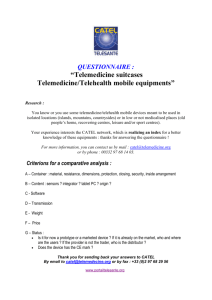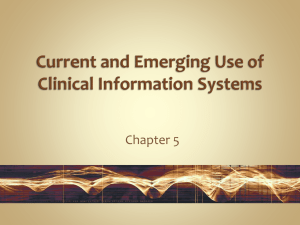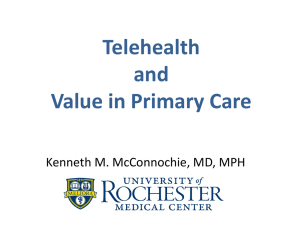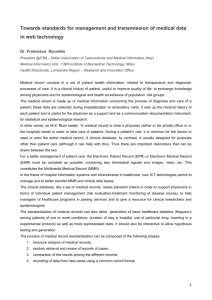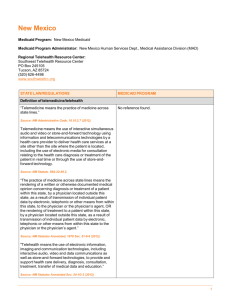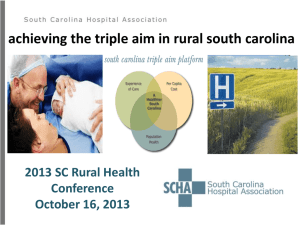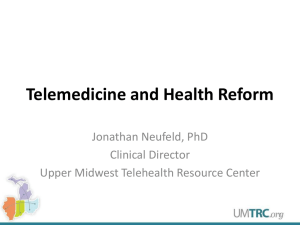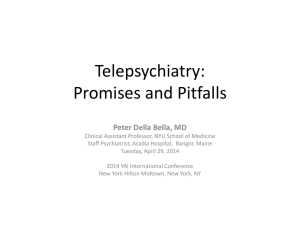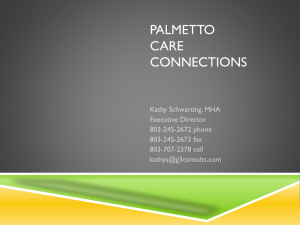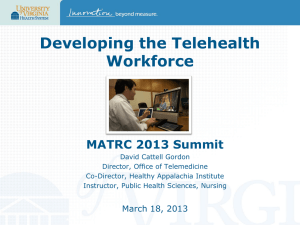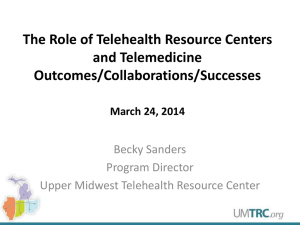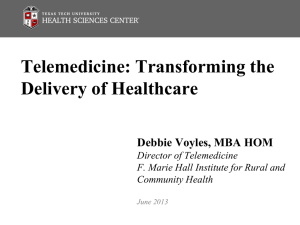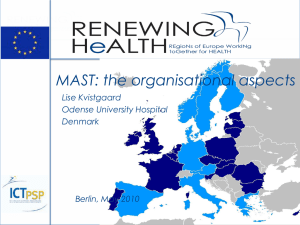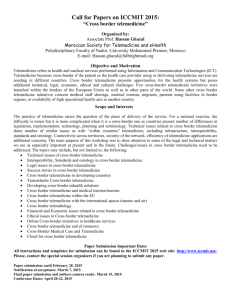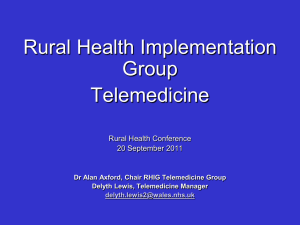Telemedicine
advertisement
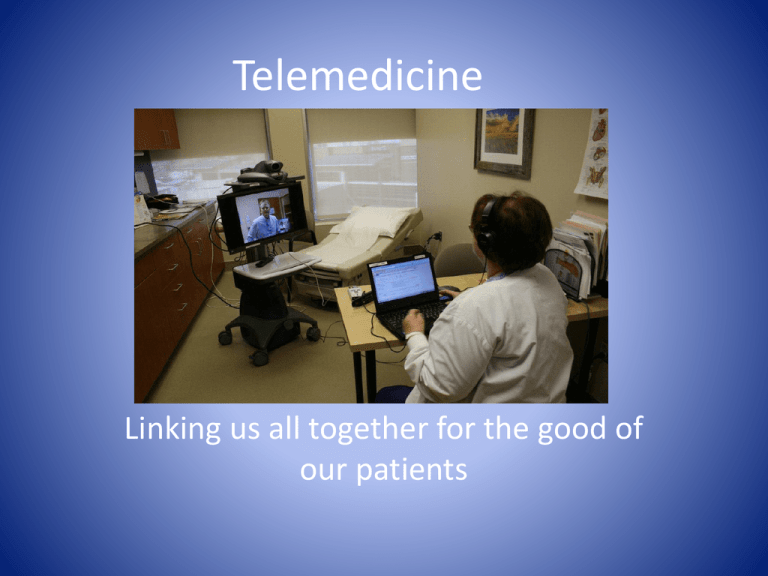
Telemedicine Linking us all together for the good of our patients What is Telehealth? What is Telemedicine? • Telemedicine: The use of medical information exchanged from one site to another via electronic communication to improve a patient’s clinical health status. • Telehealth: Broader scope that does not always include clinical services such as education or EMR; examples would be webMD or an online pre-op education. CMS: Telemedicine • Telemedicine seeks to improve patient health by permitting real time interactive communication between the patient and the practitioner at the distant site. • Distant or Hub Site • Originating or Spoke Site Advantages • • • • • • • Money Saved Travel Worries Rural Technology Improving Hometown Revenue Rapid Response Data Sharing Disadvantages • Start-up Costs – REACH est. total costs since 1995 over 5 million – Single cart $10,000 and $25,000 • Loss of Direct Human Contact • Inability of Patients/Providers to use Equipment • Equipment Malfunction How we got to this place HISTORY OF TELEMEDICINE 1860’s Telegraphs sent by Union on battlefields to rear areas with casualty reports and to order medical supplies. Around 1906, Dr Willem Einthoven used telephone wires to transmit an EKG from one part of a hospital to another . Wireless 2-way radio communication was used by military in WWII and Korea to send word to hospitals/hospital ships about casualties. 1960’s • Nebraska State Hospital used 2-way closed circuit TV to another hospital 112 miles away for consultations and education. • NASA developed telemedicine for astronauts. • Boston’s Logan Airport used closed circuit black and white TV to link its clinic with Mass. General Hospital. – Study of 1000 patients. First Telenursing report. STARPAHC • 1972 to 1975 NASA begins trials of STARPAHC (Space Technology Applied to Rural Papago Advanced Health Care) on reservations in Arizona using 2-way microwave transmissions to connect rural areas, both stationary and mobile, with medical centers in Phoenix and Tucson. 1980’s saw little growth in telemedicine. One notable achievement was in 1989. U.S. set up satellite communications between 4 U.S. medical centers and hospitals in Armenia following the Armenia earthquake • Then came the 1990’s 1990’s and Internet • • • • Digital Images and Sound Video Devices Smaller/Better Picture Quality Infrastructure Development 1993 American Telemedicine Association (ATA) Formed • Cell phone Technology • 1997 “Telemedicine Report to Congress” 2000’s • 2001 Update to the “Telemedicine Report to Congress” – This included concrete recommendations – Action plans for specific government agencies – Established O.A.T. (Office for Advancement of Telehealth) under Department of Health and Human Services. – Medicare and Medicaid – Veterans Administration 2000’s Cont. • • • • • HD video and flat-screen monitors. Improved bandwidth fiber optic cable. Military applications in Iraq and Afghanistan. More rural connections. Entire states becoming wired for telehealth services. • Smart phone technology • Information over Internet increasing (webMD) How we make it work USING TELEHEALTH Types or Disciplines of Telemedicine • Live or Clinical Interaction • Store and Forward: – Radiology – Dermatology • Websites $80.00 send a photo, they send back diagnosis and treatment advice. • Also uses live interactive telemedicine – Ophthalmology • Benefis NICU – Retinopathy of Prematurity (ROP) • Dr Weaver and Dr Murdock study 2007 to 2012 • Kept NICU accredited and cost savings of 14 transports $157,500 vs. 176 transports $1.5 million Tele-ICU • Becoming more common as Intensivists become rarer. – 6,000 ICU’s; only 5,500 board certified Intensivists • start-up costs: $ 2 million, $600,000 to $1,000,000 yearly operating • ROI by keeping patients in local hospitals Tele-ICU cont. Tele-Nursing • Hospital – Critical care – ER • Home Health • Wound Care • Education Tele-ER • South Dakota. – 860 eEmergency cases in 2012 • University of Utah Burn Center – Burn transfers from regional hospitals – Over or under estimating percentage by >500% – Burn calculation by burn specialists in person and by video within 1% Home Health • • • • Readmission penalties CHF and Diabetes Ease of use for patients Daily reminders Other Disciplines • Tele-Pharmacy – Retail – Hospital • Occupational Therapy • Speech Therapy Telemedicine Regions Montana Telehealth Networks REACH Network Getting Connected Rattlesnake Bite Wagner, South Dakota • Pre-Teen girl bit on ankle • 30 mins. from hospital (POV) • Hospital staffed by Physician small nursing and support staff. • Patient in shock on arrival activated Telemedicine connection to Sioux Falls Hospital ER Wagner Continued • Anti-venom given along with shock support. • Developed anaphylaxis • Unable to intubate and had cricothyrotomy performed. • Went into cardiac arrest with defibrillation done. Wagner: Continued • Staff commented afterward, support from the nursing and ancillary staff at the hub site. – Nurses checking doses – Code record with times – Keeping flight crew informed REACH and North Central Montana • Since 2003 REACH community members have been saved 1.5 million miles of travel. Almost 60 times around the world at the equator. • Kept families from traveling to out of state Medical Centers for monthly follow ups. • In one day there were 11 patients at a Cardiology Clinic that saved over 1100 miles of travel. • Practitioner in Havre seeing patients in Malta New Cardiac Patient • 67 y/o male. No previous cardiac Hx. Strong family history. 2 months of exercise induced chest/neck pain. • Was seen at 3 separate outpatient clinics in 3 separate towns, including stress test within last month. • New patient to cardiologist Cardiac Continued… • Had a one hour visit via telemedicine with results other clinics and stress test available to cardiologist • Telemedicine encounter same day as winter storm hit North Central Montana • Had a heart catheterization done within one week and one stent in 99% occlusion in RCA REACH into the Future • • • • • REACH/ER Education Opportunities/CEU’s Neurology/Stroke Post-Operative Follow-Up Pre-Hospital Video Where do we go from here? • Home Health • Smart Phones • Wireless – Pre-hospital – Inter-hospital transfers • Web based programs – Clinical/Direct patient – Educational – Virtual REACH Team at Benefis • Education: In state or out of state. • Connections other than to Great Falls • Technical advice Questions? • http://reach-montana.org/ Brian Christensen, RN Clinical Telehealth Coordinator REACH/ER 406-455-4282 BrianChristensen@benefis.org Bibliography 1. CMS.gov 2. Wheeler, Tom. 2006. Mr. Lincolns T-Mails: How Lincoln used Telegraphs to Win the Civil War. 3. Roger Allan.2006.ABrief History of Telemedicine. Electronic design 4. History of Telemedicine. Health Information Technology Data base 5. Telehealth Nursing fact Sheet. 2011 ATA Nursing SIG. 6. PSU.edu. Telenursing. Chiaraluna et al. 2010 7. Avera ecare.com 8. Saffell et al. J of Trauma.2004 Saffell et al. J of Telemedicine 2006 and 2009 9. Rafika.2012. American College of Cardiology Bibliography (Cont.) • • • • • • 10. Kumar et al. 2013. AHIM.org 11. Avera ecare.com 12. Saffell et al. 2004 J. Trauma 13. Saffell et al. 2006 and 2009 J. Telemedicine 14. Mashima et al. 2003. American Journal of Speech Pathology. 15. Szivek, Pamela, Pediatric O.T.; Telehealth’s New Entrant: Occupational Therapy. NRTRC Conference; 2013 • 16. Telehealth Resource Center web site. • 17. CardioSource. 2013 • 18. Telemedicine and eHealth. Latifi. 2012
